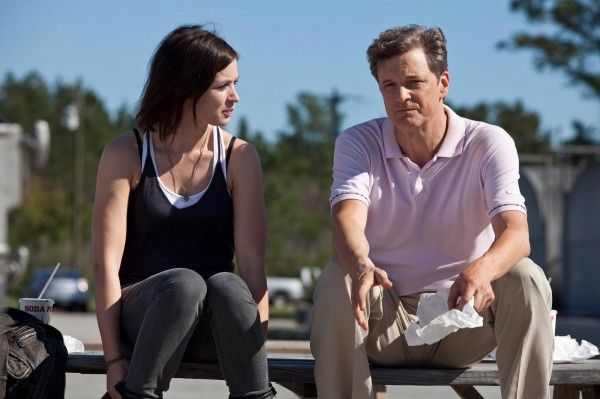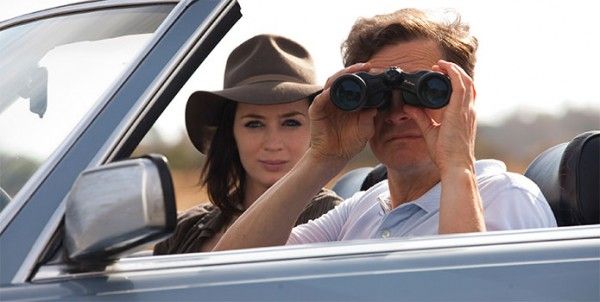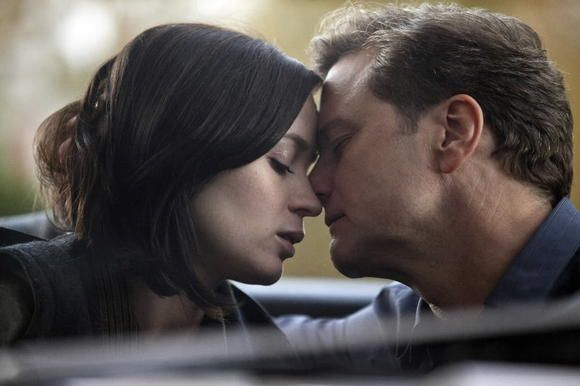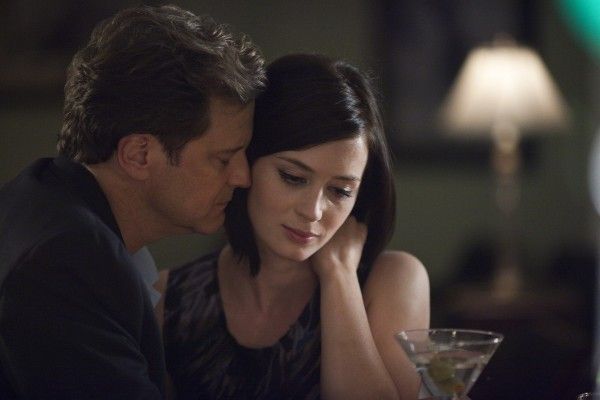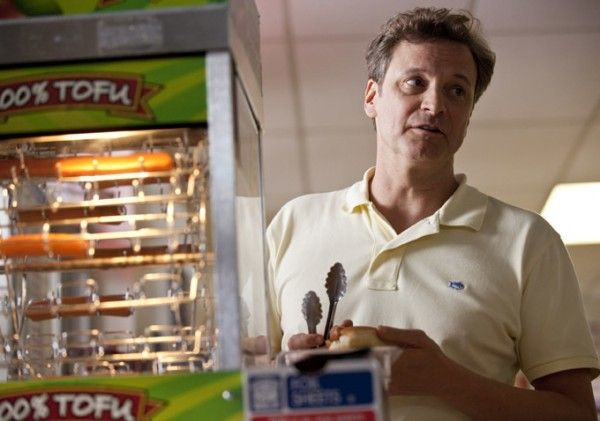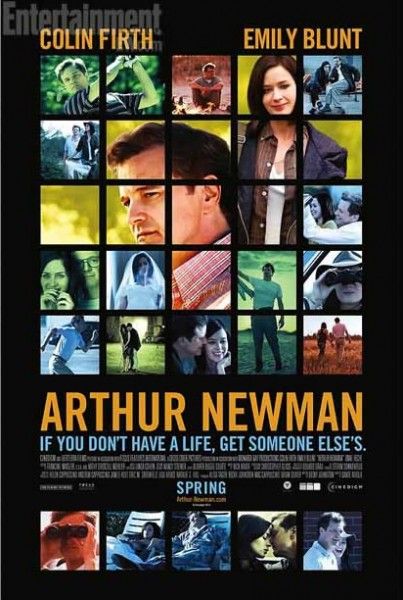The indie dramedy Arthur Newman tells the story of two unlikely souls for fall in love while they are exploring and discovering who they really are. Divorced, disconnected, dissatisfied and depressed, Wallace Avery (Colin Firth) is tired of his life, so he hits the road as Arthur Newman. On his road trip, he meets Michaela “Mike” Fitzgerald (Emily Blunt), who is fleeing from her own turmoil, and the unexpected couple learn who they can be through each other.
At the film’s press day, co-stars Colin Firth and Emily Blunt talked about what interested them in these characters, playing people who take on different personas, how they stuck to the specific tone and dialogue of the script with little improvisation, finding the voice of a character, and what audiences will make of the film. Emily Blunt also talked about her recent experience making All You Need Is Kill with Tom Cruise, and Colin Firth said that he won’t be doing Bridget Jones’s Baby. Check out what they had to say after the jump.
Question: What interested you in these characters?
EMILY BLUNT: The script, in general terms, was just completely refreshing in how original it was. It was pretty uncompromising, actually. It didn’t want to conform to being any genre, or anything I could sum up in a one-liner pitch. But, I liked the idea that the more we mask ourselves, the freer we’re able to be within ourselves. I don’t particularly feel that these characters are crazy. They just are acting on that impulse. I think Arthur is much kinder to Mike than she is to him. I think she finds it baffling, at first, because she really tries, desperately, to keep everyone at arm’s length by adopting this crazy persona. I couldn’t put my finger on quite why I was so drawn to the script, and that’s always quite a good way in. If you feel there’s ambiguity there, that’s something to play with.
COLIN FIRTH: They’re both looking for connection. What could seem like an implausible coincidence, that two people who change their identity find each other on the road, isn’t really. It’s chance that they meet, but she would have gone her own way, right at the beginning, had she not found out that he was lying about who he was. That’s actually the very reason she decides to be curious about him and stick with him for awhile. She’s driven by that fact. There’s some sense of commonality there. These are two people who have somehow managed to deny themselves any real intimacy, for years and years. Whether they’re looking for that in each other, they somehow find it through the paradox of pretending to be other people. It’s only when they quite literally dress up as others and talk like somebody else that they actually can express something a little deeper and allow themselves to get sexual, get intimate and get closer.
What sort of rehearsal process did you have for this?
BLUNT: There wasn’t one, really.
FIRTH: We’d encounter a scene with a preconception about it and think, “This is what it’s for. This is what it’s about. This is what it will feel like. It will be funny.” And then, often we were surprised by it. In some ways, it always felt like that. The first reading of the script had a lot of mystery to it, for me. I wasn’t sure what it contained. I wasn’t sure who these people were going to turn out to be. It was a little bit elusive. Doing the scenes, it kept feeling like we’d uncovered something. I didn’t see it until we played it, and that kept happening. One of the great things about (director) Dante [Ariola] is that he comes in with great strong ideas, but he’s not rigid about them, and that’s the perfect combination. You’ve got a great launch pad for everything. A director who’s flexible to the point of having absolutely nothing to offer, from the beginning, is no good at all. It’s the same with actors. Come in with something, and then be prepared to make it malleable. It was constantly quite exhilarating, just to see what things had to offer.
How was it to play characters that want to take on other personas, when that’s something that you do, as actors?
BLUNT: I think a lot of people want to, at some point in their life, be someone else, run away and escape, in some way. We do get to do it. We have a job that allows for that. We have an outlet for it.
FIRTH: I think a lot of people whose lives seem unremarkable to others are often stuck in a role. Speaking for myself, I think that his role, up to that point in his life, is ludicrous. He’s this boy scout-ish, proper guy who wasn’t much to do with him, at all. I think that people do get stuck in it. They try to do what they think is the appropriate thing, at every stage, and it doesn’t necessarily deliver what anybody else needs. His marriage, obviously, didn’t work. His relationship with his son is catastrophic, as is his relationship with any subsequent girlfriend. He’s not getting anywhere. So, all of this doing the right thing, in a precious, prissy way, hasn’t worked out. That was probably the role. In some ways, rather than escaping his true self and trying to reinvent, he was probably shedding something that was bogus, from the start.
How much improvisation did you get to do?
BLUNT: We didn’t, really. There was a very specific tone to the script. There was a starkness to it. I never really felt the need to embellish it.
FIRTH: The stuff that was improvised was mostly without dialogue. A lot of that montage stuff, in the military costume and with the pregnancy, were things we thought up as we went.
BLUNT: I’ve worked both ways. I’ve done films that are entirely improvised, and that’s exhilarating and challenging, in itself. But, there was a specificity to this characters and how they interacted that was all (writer/producer) Becky Johnston. I never felt the need to try to elaborate on anything that she’d written.
How do you like playing an American?
BLUNT: I like it. I find that it really helps that I live in the States. I’m married to an American, and I have lots of American friends. If you’re immersed in the sounds on a habitual level, that helps you a lot. But, I don’t necessarily think of it as an accent. I think you’ve got to just find a voice for the person. Who that person is becomes the voice. It’s not necessarily that you’re concentrating on getting your vowel sounds right. Even if it’s not perfect, I think you’ve gotta do all the technical stuff, and then just hurl it out the window because you’ve got to just play the character.
FIRTH: You just focus on a character, and that’s his voice. It’s not negotiable, after awhile. It’s who you hear, and that’s just him. It’s not anybody else. It’s not any of the other 180,000,000 Americans. It’s just him. It starts to find its way into your speech. So, you just have to own that.
These two characters are so different from anything that you’ve played in the past. How did you find who they were?
BLUNT: I never know how to talk about the process. I read a couple of books on schizophrenia, not that Mike is actually schizophrenic. She’s just terrified that she will become so. But, I got an idea for what maybe her upbringing might have been like, or what she might have witnessed or been around, with her family. I never really like talking about the process because I don’t know how to talk about it without either sounding wanky or like I don’t know what I’m talking about. It just sort of happens. I think about it a lot.
FIRTH: No matter how much technique you draw on or how much training you have, acting is a mystery.
Colin, where did you think Arthur was going from where he is, at the end of the film?
FIRTH: It’s interesting, actually. One of the things I like about the story is that that question comes up. We had that discussion, endlessly. If you’re playing a historical character, everybody knows what happens. In this case, it does provoke, “Will they meet up again? Could something flourish? Will his son accept him? Will his sister accept him?” All the issues they’ve been discussing through the film still have a lot of questions in place.
BLUNT: But, I like that because I think sometimes a tidy resolution can be really unsatisfying. It’s just more exciting to not quite know sometimes.
What do you think audiences will make of this film?
FIRTH: In some ways, it’s going to be difficult for this film, out there, because expectations define people. They’ll be like, “When’s the romantic comedy going to start?” If this film were in Swedish or Polish with unknown actors, there would be less of that expectation. If you have familiar faces in something which is to do with people who are inconspicuous and lost, it takes awhile to adjust to what it is. But, that is precisely what drew me to it. I found that it really conformed to the way I experience things.
Emily, how was the shoot for All You Need Is Kill?
BLUNT: It was fun! It was quite hardcore. I’ve never done anything like that. The amount of training and physical duress that you go through was intense. But, I loved working with Tom [Cruise]. It was a dream. And Doug Liman definitely has an unconventional approach to any genre. I don’t think he’s a conformist, anyway. It was a long process, the whole film. I only just wrapped, really. But, I liked it. For a movie of that scale, it was surprisingly collaborative.
Colin, are you going to do Bridget Jones’s Baby?
FIRTH: I’m afraid not.
Arthur Newman opens in theaters on April 26th.


